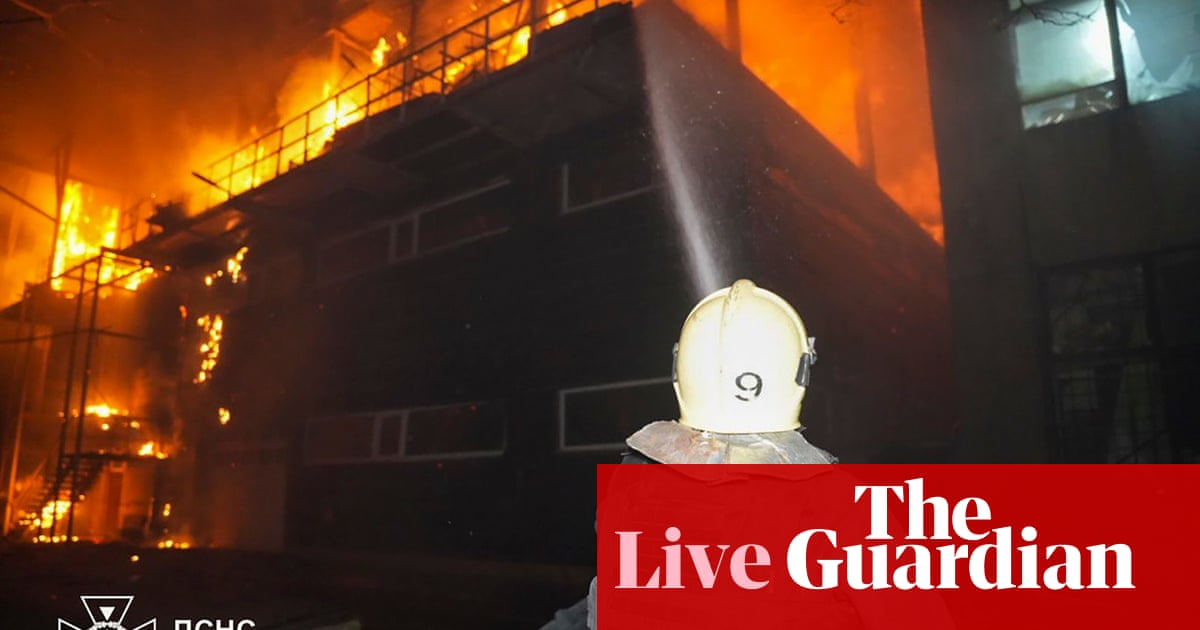Welcome back to our live coverage of Russia’s war onUkraine.
Russian PresidentVladimir Putinhas said for the first time in years that he is open to bilateral talks with Ukraine, having previously demandedVolodymyr Zelenskyybe replaced before it could happen.
Speaking to Russian state TV, Putin said:
His comments were followed by Russian forces launching a mass overnight drone attack on Ukraine’s Black Sea port city ofOdesa, which, according to local officials, injured three people and damaged many apartment buildings.
“The enemy targeted a residential area in a densely populated district of Odesa,” mayor Hennadiy Trukhanov wrote in a post on Telegram.
Putin’s change of rhetoric on truce talks came as representatives from Ukraine, the UK, France and the US were set to meet in London tomorrow to talk about a potential ceasefire agreement.
Zelenskyy, under pressure from Washington to agree to some sort of agreement or have support potentially withdrawn, said the London talks “have a primary task: to push for an unconditional ceasefire. This must be the starting point”.
In some other developments:
The Ukrainian air force said on Tuesday that Russia launched 54 drones during an overnight attack. The air force said it shot down 38 drones and another 16 did not reach their targets, likely due to electronic warfare countermeasures.
Russia’s air defence units destroyed 10 Ukrainian drones overnight, downing half of them over the Crimean Peninsula, according to reports.
Leaks suggest the Trump administration is now pushing for a “peace deal” that heavily favours Russia. It would include a pause to the war along the existing 1,000km frontline; recognition that Crimea belongs to Moscow; and a veto on Ukraine’s Nato membership.
There are also unconfirmed reports that theZaporizhzhia nuclear power station– which Russia seized in 2022 – would be part of a “neutral” zone.
As we mentioned in the opening post, Ukraine is due to participate in talks with US and European countries in London on Wednesday.
British prime ministerKeir Starmerhas toldVolodymyr Zelenskyyhe supports Kyiv’s calls for a full ceasefire and said the UK and France, backed by a “coalition of the willing”, have proposed providing a “reassurance” force for Ukraine in the event of a ceasefire.
The US, however, has so far held off its support as it pulls back from its long role as a bulwark of European security.
In a post on X, Zelenskyy said:
Russia has maintained its maximalist demands: thatUkrainecede all the land Putin claims to have annexed and accept permanent neutrality. Ukraine says that would amount to surrender and leave it undefended if Moscow attacks again. The opposing demands have frustrated Washington, with US President Donald Trump wanting to bring a quick end to the war, which he has described as a huge drain on American resources.
Welcome back to our live coverage of Russia’s war onUkraine.
Russian PresidentVladimir Putinhas said for the first time in years that he is open to bilateral talks with Ukraine, having previously demandedVolodymyr Zelenskyybe replaced before it could happen.
Speaking to Russian state TV, Putin said:
His comments were followed by Russian forces launching a mass overnight drone attack on Ukraine’s Black Sea port city ofOdesa, which, according to local officials, injured three people and damaged many apartment buildings.
“The enemy targeted a residential area in a densely populated district of Odesa,” mayor Hennadiy Trukhanov wrote in a post on Telegram.
Putin’s change of rhetoric on truce talks came as representatives from Ukraine, the UK, France and the US were set to meet in London tomorrow to talk about a potential ceasefire agreement.
Zelenskyy, under pressure from Washington to agree to some sort of agreement or have support potentially withdrawn, said the London talks “have a primary task: to push for an unconditional ceasefire. This must be the starting point”.
In some other developments:
The Ukrainian air force said on Tuesday that Russia launched 54 drones during an overnight attack. The air force said it shot down 38 drones and another 16 did not reach their targets, likely due to electronic warfare countermeasures.
Russia’s air defence units destroyed 10 Ukrainian drones overnight, downing half of them over the Crimean Peninsula, according to reports.
Leaks suggest the Trump administration is now pushing for a “peace deal” that heavily favours Russia. It would include a pause to the war along the existing 1,000km frontline; recognition that Crimea belongs to Moscow; and a veto on Ukraine’s Nato membership.
There are also unconfirmed reports that theZaporizhzhia nuclear power station– which Russia seized in 2022 – would be part of a “neutral” zone.
